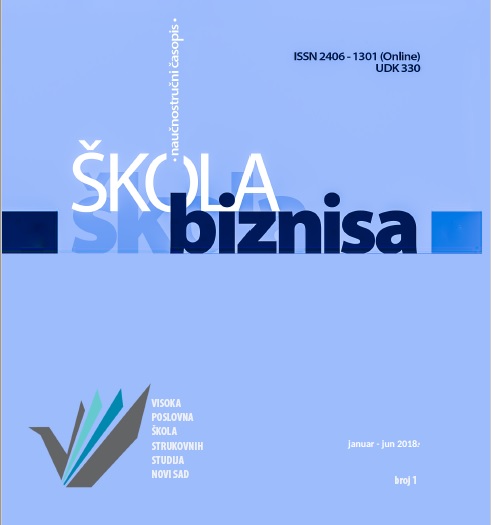SERBIAN ORGANIC FOOD CONSUMER PROFILE – CONTRADICTIONS OF PREVIOUS RESEARCHES AND METHODOLOGICAL POSSIBILITIES
Abstract
Previous research of organic food consumers, both in the world and in domestic conditions, failed to determine the unique characteristics of the profiles of these consumers. Among various reasons that could cause this condition, one is insufficient knowledge and / or use of all methodological potentials of a statistical instrumentarium. This paper deals with the two previously mentioned topics - showing the inconsistency of the description of the organic food consumers profile in recent domestic research, and pointing out the need to include the interaction of the variables that are descriptors of segments by recalling foreign research practice. The importance of the work is in potential elimination of part of possible contradictions of future research, which can have significant implications for all stages in the marketing management process of organic food suppliers.
References
Boškov, V. (2015). Organska hrana i tradicionalni način uzgoja kao mogućnost razvoja Srbije. Škola biznisa,1/2015, 129-137.
Djokic, N., Grubor, A., Milicevic, N., & Petrov, V. (2018). New Market Segmentation Knowledge in the Function of Bioeconomy Development in Serbia. Amfiteatru Economic, 20(49), 700. doi:10.24818/ea/2018/49/700
Đokić, N., & Milićević, N. (2016). Profil potrošača i prepreke povećanja potrošnje organske hrane u Srbiji. Anali Ekonomskog fakulteta u Subotici, 53(36), 65-77.
Grubor, A., & Djokic, N. (2016). Organic food consumer profile in the Republic of Serbia. British Food Journal, 118(1), 164-182. doi:10.1108/bfj-06-2015-0225
Peric, N., Vasic-Nikcevic, A., & Vujic, N. (2017). Consumers attitudes on organic food in Serbia and Croatia: A comparative analysis. Ekonomika poljoprivrede, 64(3), 1049-1064. doi:10.5937/ekopolj1703049p
Simic, I. (2017). Organic Agriculture in Serbia At a Glance 2017. Belgrade: National Association Serbia Organica.
Vapa-Tankosić, J., Ignjatijević, S., Kranjac, M., Lekić, S., & Prodanović, R. (2018). Willingness to pay for organic products on the Serbian market. International Food and Agribusiness Management Review, 21(6), 791-801. doi:10.22434/ifamr2017.0068
Vehapi, S., & Dolicanin, E. (2016). Consumers behavior on organic food: Evidence from the Republic of Serbia. Ekonomika poljoprivrede, 63(3), 871-889. doi:10.5937/ekopolj1603871v
Verbeke, W. (2005). Consumer acceptance of functional foods: socio-demographic, cognitive and attitudinal determinants. Food Quality and Preference, 16(1), 45-57. doi:10.1016/j.foodqual.2004.01.001
- Authors retain copyright and grant the journal right of first publication with the work simultaneously licensed under a Creative Commons Attribution License that allows others to share the work with an acknowledgement of the work's authorship and initial publication in this journal.
- Authors are able to enter into separate, additional contractual arrangements for the non-exclusive distribution of the journal's published version of the work (e.g., post it to an institutional repository or publish it in a book), with an acknowledgement of its initial publication in this journal.
- Authors are permitted and encouraged to post their work online (e.g., in institutional repositories or on their website) prior to and during the submission process, as it can lead to productive exchanges, as well as earlier and greater citation of published work (See The Effect of Open Access).

